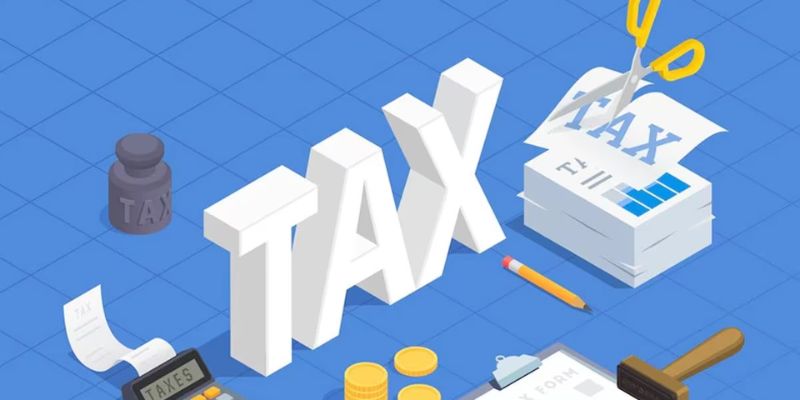Understanding the Difference Between TDS and TCS
Triston Martin
Feb 03, 2024
Accurate tax tracking and filing can be a challenging procedure for businesses. It entails negotiating the TDS (tax deducted at the source) and TCS (tax collected at source) components of the tax system in India.
While both have an important role in affirming compliance with Indian tax regulations, understanding their differences is crucial to the success of any business. We will explain what these terms mean and how they differ from one another so that you can rise to the challenge of meeting your company's taxation requirements effectively.
What Is TDS

The Tax Deducted at Source (TDS) system is a way of collecting income tax in India. It requires employers or third-party contractors to deduct a certain amount from their employees' or contractors' salaries, commissions, contract payments, etc., before paying out the net amount.
This process ensures that an employee pays taxes on income while earning it rather than making the lump-sum payment during the filing season.
Deductions must be made per prescribed rates set by the government and deposited to the credit of the Central Government with an authorized bank within specified time limits.
Understanding TDS with an Example
Let's look at an example to better understand the concept of TDS.
Mr. John is a software development employee working for XYZ IT Solutions Ltd. His salary for January 2021 was Rs. 50,000, including all allowances. Under Section 192 of the Income Tax Act, 1961, XYZ IT Solutions must deduct tax from Mr. John's salary payment before paying him his net amount.
According to the rules set by the government and considering that Mr. John falls under the 30% tax bracket, 10% (Rs 5,000) will be deducted from his salary and deposited with an authorized bank as TDS on behalf of Mr. John while making payment to him for Rs 45,000 (50,000 - 5,000).
What Is TCS?

Tax Collected at Source (TCS) works similarly to TDS but applies to transactions where goods are sold instead of services. It applies to only specific goods and services such as alcohol, tobacco, and scrap.
TCS is applicable on the seller’s part during the sale, which means that a certain rate set by the government must be deducted from the amount received and deposited with the government within specified time limits.
Understanding TCS with an Example
To understand how TCS works, let's look at another example. ABC Motors Ltd., a car dealer in Mumbai, sold an old car to Rahul for Rs. 50,000 on 2nd January 2021.
As per the provisions of section 206C(1H) of the Income Tax Act, 1961, ABC Motors Ltd. is liable to collect tax from Rahul at 1% of the sale consideration while paying him. So, ABC Motors Ltd. must deduct Rs 500 (50,000 x 0.01) as TCS and deposit it with the government before giving the balance amount of Rs 49,500 to Rahul.
Difference Between TDS And TCS
- TDS applies to services, while TCS applies to goods.
- The employer makes TDS payments, while the seller makes TCS payments.
- The rate of deduction in the case of TDS is set by the government based on income slabs and specified categories, whereas it is fixed by the government for TCS at 0.1% for most of the goods mentioned under Section 206C(1).
- In the case of TDS, a PAN card number must be provided for paying tax deductions, but no PAN details are needed for payment through TCS.
- Under the provisions of section 194C/194J, any contractor or sub-contractor who receives more than Rs. 30,000 must get TDS deducted and paid to the government. In contrast, there are no such conditions under TCS.
- TDS is credited to the taxpayer's account after filing a return of income each year, whereas the credit for TCS can be availed only on producing Form 27D while filing Income Tax Return (ITR).
- The taxpayer can claim the deposited amount of TDS, as per section 200A, in their ITR form without any supporting documents. However, in case of undue credits or excess payments made against TCS, supporting documents such as Form 27D need to be provided along with ITR for claiming refunds from the government.
- Interest charges for delayed payments are applicable in both TDS and TCS, but the interest rate is higher on late payments made under TCS. The interest rate charged in case of late payment of TCS is 18% per annum, whereas it is 12% per annum when paying TDS late.
Understanding these differences can allow businesses to better comply with Indian tax regulations and ensure taxes are paid correctly. With accurate accounting, businesses can ensure they remain compliant and avoid penalties from the government.
Understanding the difference between TDS and TCS is essential for a business to stay up-to-date with its taxation requirements in India.
Who will deduct TDS and TCS?
The employer deducts TDS from payments to employees, contract workers, and third-party contractors. The seller of goods and services will be responsible for deducting TCS at the time of sale. It must be noted that any contractor or sub-contractor who receives more than Rs. 30,000 must get TDS deducted and paid to the government as per section 194C/194J.
There are no such conditions under TCS. Both the employer and seller are required to deposit these amounts within specified time limits with an authorized bank so it can credit them to the Central Government's account.
Failure to do so may result in applicable interest charges or penalties for late payment. It is also important for businesses to keep accurate records of all TDS and TCS payments, as these will be used to claim refunds from the government.
What is TDS and TCS amount?
The rates of TDS and TCS vary depending on the income slab or goods being sold. The government sets the rate of deduction for TDS based on income slabs and specified categories, such as salary payments, commission payments, etc.
Currently, the range is from 5% to 30%. On the other hand, a fixed rate of 0.1% applicable to most items mentioned in Section 206C(1) of the Income Tax Act 1961 applies to TCS.
In some cases, different rates may apply if prescribed by law, including higher rates for buyers who do not have a PAN card issued by the government. It must be noted that interest charges are imposed for late payments in both cases at 12% per annum for TDS and 18% per annum for TCS.
FAQS
Are there any documents required to be submitted for claiming credit for TCS?
Yes, as per the provisions of section 206C(1H) of the Income Tax Act, 1961, Form 27D must be produced while filing an income tax return (ITR) for claiming credit of TCS.
How can I pay TDS and TCS?
The amount deducted as TDS or TCS must be deposited with an authorized bank so it can credit to the Central Government's account. The tax collected should be credited on or before the 7th of the succeeding month in which the deduction is made.
What is the time limit for a TDS refund?
The taxpayer can claim the TDS deposited in their ITR form without supporting documents. However, in case of undue credits or excess payments made against TCS, supporting documents such as Form 27D need to be provided along with ITR for claiming refunds from the government.
Conclusion
In summary, tracking and collecting taxes are critical functions businesses must be aware of. Understanding the difference between TDS and TCS is important since it could mean avoiding penalties and fines at the end of the year if you don't handle them correctly. Companies should take full advantage of all available resources to help make this process easier and simpler.







